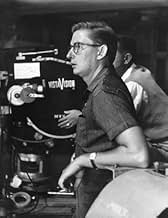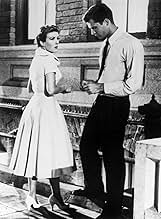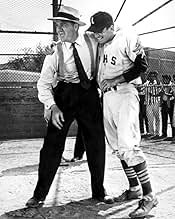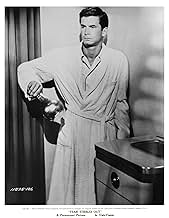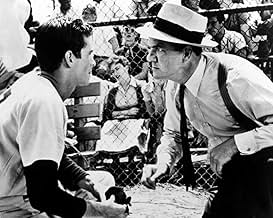AVALIAÇÃO DA IMDb
6,9/10
2,2 mil
SUA AVALIAÇÃO
Adicionar um enredo no seu idiomaTrue story of the life of Jimmy Piersall, who battled mental illness to achieve stardom in major league baseball.True story of the life of Jimmy Piersall, who battled mental illness to achieve stardom in major league baseball.True story of the life of Jimmy Piersall, who battled mental illness to achieve stardom in major league baseball.
- Prêmios
- 1 indicação no total
John Aberle
- Ballplayer
- (não creditado)
Eric Alden
- Policeman
- (não creditado)
Heather Ames
- Nurse
- (não creditado)
Sam Balter
- Broadcaster
- (narração)
- (não creditado)
Mary Benoit
- Nurse
- (não creditado)
John Benson
- Reporter
- (não creditado)
Don Brodie
- Reporter Evans
- (não creditado)
Richard Bull
- Reporter Slade
- (não creditado)
Bart Burns
- Joe Cronin
- (não creditado)
Edd Byrnes
- Boy in Car Assisting Jimmy Up Stairway
- (não creditado)
Wade Cagle
- Intern
- (não creditado)
Keith Coyne
- Baby
- (não creditado)
Enredo
Você sabia?
- CuriosidadesThe real Jimmy Piersall disowned the movie due to its distortion of the facts. Based on the success of his autobiography and the movie, Piersall penned a second book in 1985 called The Truth Hurts, which detailed his ousting from the White Sox organization.
- Erros de gravaçãoClose-up shots of Jimmy Piersall playing shortstop and right field reveal a low outfield wall backed by trees in the background. These games were supposed to be in Fenway Park, which would have a high left field wall and bleachers in right field.
- Citações
Jim Piersall: I don't care what happens. I love you Mary!
- ConexõesFeatured in Diamonds on the Silver Screen (1992)
Avaliação em destaque
If this story were filmed today, the treatment would be much more stark and realistic. But for a film in the mid-50s, it provided quite a punch in conveying the agony of growing up with a loving but very demanding father. When I saw it in the theater, I never questioned Anthony Perkins as a teenager in the first part; today, this is much more difficult to swallow. Even though dated somewhat, the film is still worth a watch.
Karl Malden is excellent as a father driven by his own sense of failure to attempt to live vicariously through his son. As a result, he literally orchestrates his son's life. Never accepting the `glory' of the moment, he places constant expectations and demands on his son. Possibly this is Malden's best role.
Tony Perkins has some fine moments of anguish and neuroticism as the ball player, Jimmy Piersall. One scene between his father and him after his breakdown is superbly acted with Perkins running through a panoply of emotions. That this emotional turmoil is somewhat subdued is to the credit of the film. Norma Moore gives a competent and rather understated performance as his wife. The doctor, played by Adam Williams, is appropriately comforting, but he's not up to delivering the big line, especially in his intense scene with Malden. Regretfully, Perry Wilson as Piersall's submissive mother, didn't have more of a role.
Some very nice photography using the angularity of steps and bleachers and railroad stations conveys the underlying jaggedness and tension of emotions. Elmer Bernstein's soundtrack is effective in supporting the mood of the film.
Karl Malden is excellent as a father driven by his own sense of failure to attempt to live vicariously through his son. As a result, he literally orchestrates his son's life. Never accepting the `glory' of the moment, he places constant expectations and demands on his son. Possibly this is Malden's best role.
Tony Perkins has some fine moments of anguish and neuroticism as the ball player, Jimmy Piersall. One scene between his father and him after his breakdown is superbly acted with Perkins running through a panoply of emotions. That this emotional turmoil is somewhat subdued is to the credit of the film. Norma Moore gives a competent and rather understated performance as his wife. The doctor, played by Adam Williams, is appropriately comforting, but he's not up to delivering the big line, especially in his intense scene with Malden. Regretfully, Perry Wilson as Piersall's submissive mother, didn't have more of a role.
Some very nice photography using the angularity of steps and bleachers and railroad stations conveys the underlying jaggedness and tension of emotions. Elmer Bernstein's soundtrack is effective in supporting the mood of the film.
- dhoffman
- 15 de mar. de 2001
- Link permanente
Principais escolhas
Faça login para avaliar e ver a lista de recomendações personalizadas
- How long is Fear Strikes Out?Fornecido pela Alexa
Detalhes
- Data de lançamento
- País de origem
- Idioma
- Também conhecido como
- Fear Strikes Out
- Locações de filme
- Empresa de produção
- Consulte mais créditos da empresa na IMDbPro
- Tempo de duração1 hora 40 minutos
- Cor
- Proporção
- 1.85 : 1
Contribua para esta página
Sugerir uma alteração ou adicionar conteúdo ausente

Principal brecha
By what name was Vencendo o Medo (1957) officially released in Canada in English?
Responda

